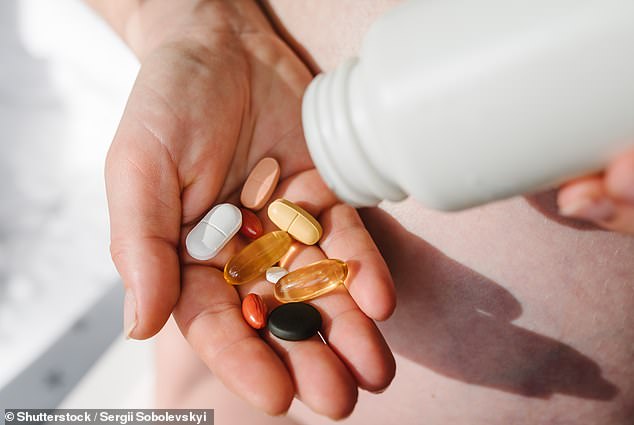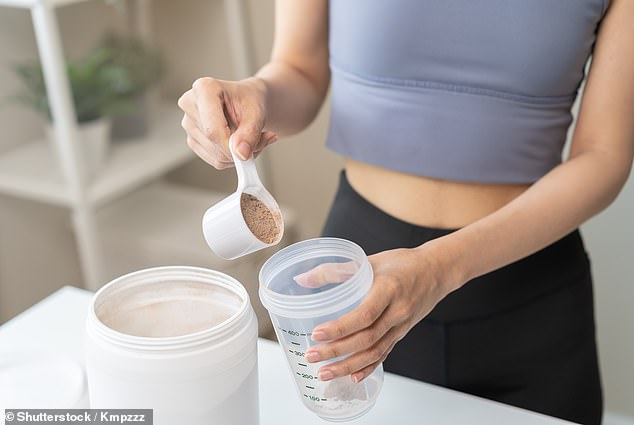
Alzheimer’s expert reveals the ‘holy grail’ supplements to prevent memory-robbing disease
An Alzheimer’s disease expert has revealed the two ‘holy grail’ supplements she urges women to take to prevent the memory-robbing disease.
Alzheimer’s disease, the most common form of dementia, affects nearly 7million Americans, with that figure set to nearly double by 2050.
About two-thirds of these patients are women, which experts have suggested may be due to women generally living longer than men and protective hormones like estrogen steeply declining in older age.
Louisa Nicola, a neurophysiologist who has spent the last decade studying Alzheimer’s disease in women, warned that while Alzheimer’s is traditionally a disease of old age, it ‘takes 30 years to progress,’ so early interventions are key for preventing it.
Along with regular, intense exercise and a diet rich in whole grains, berries and dark, leafy greens, Nicola also recommends two supplements for women that a growing body of evidence suggests may lower Alzheimer’s risk.
The first is the omega-3 fatty acid docosahexaenoic acid (DHA), a type of ‘healthy fat’ found in fatty fish, as well as flaxseeds, walnuts and soybeans.
DHA is a crucial component of the protective layers coating brain cells called membranes and helps release neurotransmitters responsible for cognitive function, memory and learning.
However, the body can’t make enough DHA on its own, so supplements, along with DHA-rich foods, may help fill crucial gaps and ‘literally feed your brain,’ Nicola said.
Supplements like omega-3 fatty acids have been shown to lower the risk of Alzheimer’s and prevent the progression of the disease (stock image)

Louisa Nicola, a neurophysiologist who has studied Alzheimer’s in women for the past decade, called DHA and creatine ‘holy grail’ supplements for women at a recent event
DHA is largely found in fatty fish such as salmon, mackerel, tuna, sardines and herring, as well as shellfish like oysters, clams and scallops. Plant-based sources include flaxseeds, chia seeds, walnuts and soybeans.
Human breast milk also contains traces of DHA, which helps boost an infant’s brain, eye, nervous system and cognitive development.
DHA is thought to help reduce amyloid and tau, toxic proteins that build up and form tangles in the brain that cause Alzheimer’s disease.
It has also been shown to reduce inflammation in the brain that damages neurons and promotes the spread of amyloid and tau tangles.
A review in the American Journal of Clinical Nutrition of 31 studies and more than 100,000 participants found that ‘supplemental omega-3 fatty acid use was significantly associated with a lower risk of [Alzheimer’s disease].’
And in 2023, researchers at the University of Illinois at Chicago developed a form of DHA called LPC-DHA, which increased DHA levels in the retina and reduced vision problems that accompany the development of Alzheimer’s.
Some studies have also suggested women may be more responsive to DHA because estrogen helps enhance the body’s ability to synthesize it.
Nicola recommended women take about two grams (2,000 milligrams) of combined DHA and eicosapentaenoic acid (EPA) every day.
Sold in capsules, EPA-DHA costs between $20 and $40 depending on the dosage.
Speaking at an event earlier this month, Nicola also recommended creatine, a compound found in muscle and brain tissue that produces energy and is typically taken to improve exercise performance.
But a growing body of research suggests it may improve energy and executive function, though experts emphasize larger studies are still needed, and overusing creatine may lead to gastrointestinal issues like nausea and diarrhea, as well as water retention, leading to weight gain.

Nicola, pictured here, praised DHA and said of its effects on Alzheimer’s: ‘You’re literally feed your brain’
‘[Creatine is] the holy grail of supplements,’ Nicola said.
Early research suggests the fitness supplement may help stall the development of Alzheimer’s.
A pilot study published earlier this year by the University of Kansas looked at 19 adults with Alzheimer’s disease between ages 60 and 90 who took 20 grams of creatine powder every day for eight weeks.
The team found an average of an 11 percent increase in creatine levels in the brain.
Dr Matthew Taylor, lead study author and assistant professor of dietetics and nutrition at KU School of Health Professions, said at the time: ‘There has been evidence in other populations that giving a higher dose of creatine does change brain creatine levels, but seeing it change in Alzheimer’s patients was really exciting.
‘That (11 percent) is a significant increase.’
Participants also saw improvements to their working memory, dubbed the brain’s ‘scratchpad’ for holding on to information for immediate use such as understanding a sentence or doing mental math, and executive function, which includes planning, organization and self-control.

Creatine is typically sold as a powder to mix into a drink. Though it is mainly used by athletes, early research suggests it could lower Alzheimer’s risk (stock image)
Animal studies also show creatine may protect brain cells from damage and improve overall cognitive function, though research is limited.
Nicola said: ‘It’s phenomenal for women at a dosage of around 10 grams (10,000 milligrams) a day because what it does is it helps cell energy metabolism. It helps your brain have more energy.
‘It also is neuroprotective, so it’s going to fight against inflammation.’
Women also have lower levels of creatine reserves in their bodies than men, which could make them more responsive to creatine.
Creatine is typically sold as a powder to be mixed into drinks. It costs between $20 and $50 depending on the brand and size of the container.
First Appeared on
Source link






